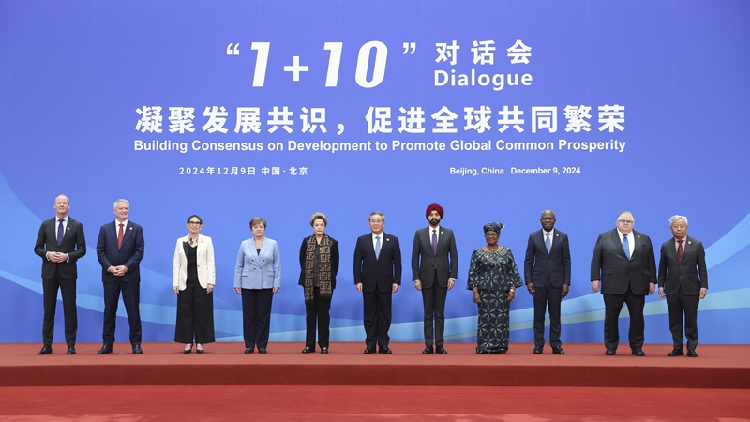Premier Li engages in discussion with 10 global economic institutions
On Monday, Chinese Premier Li Qiang emphasized China's support for international economic organizations in their vital role in global governance. He highlighted that China is prepared to actively take on international obligations that align with its capabilities, and expressed a commitment to collaborate with various parties to foster stable and healthy development of the world economy.

Li's comments came during a "1+10" dialogue in Beijing, which brought together leaders from ten international economic organizations.
The discussion, centered on "Building Consensus on Development to Promote Global Common Prosperity," featured extensive dialogue with various leaders, including Dilma Rousseff, President of the New Development Bank; Ajay Banga, President of the World Bank Group; Kristalina Georgieva, Managing Director of the International Monetary Fund; Ngozi Okonjo-Iweala, Director-General of the World Trade Organization; Rebeca Grynspan, Secretary-General of the UN Conference on Trade and Development; Gilbert Houngbo, Director-General of the International Labor Organization; Mathias Cormann, Secretary-General of the Organization for Economic Cooperation and Development; Agustin Carstens, General Manager of the Bank for International Settlements; Klaas Knot, Chair of the Financial Stability Board; and Jin Liqun, President of the Asian Infrastructure Investment Bank.
Li remarked that the current state of global economic growth shows a lack of momentum, with economic globalization and multilateralism confronting various obstacles and challenges, leading to increased uncertainties.
He urged all stakeholders to concentrate more on development, collaboratively establish a peaceful and stable development environment, enhance global governance, maintain stability in global industrial and supply chains, and cultivate new drivers of economic growth.
Emphasizing China's role as a staunch supporter of economic globalization and multilateralism, Li noted that China’s economy has significantly boosted the global economy for decades, showcasing unique characteristics. He highlighted that China's economic framework ensures steady growth, possesses the capacity for continued expansion, and generates positive spillovers.
Li reaffirmed that the foundational logic behind China's optimistic economic outlook remains steady, and the overarching goals of benefiting the world are unchanged—this reliability is a key certainty that China's economy brings to the global economic landscape.
Furthermore, Li conveyed China’s readiness to collaborate with all parties to uphold fundamental norms of international relations and the multilateral trading system.
The heads of international economic organizations commended China's significant development achievements and acknowledged that China's favorable economic outlook and commitment to high standards in trade have provided crucial stability and momentum for global peace and development. They expressed strong confidence in China’s economic transformation and future prospects.
All parties expressed readiness to deepen collaboration with China in support of multilateralism and globalization, prioritize development challenges, advocate for free trade, enhance assistance to developing nations, tackle global issues like climate change, promote inclusive global growth, and strive for shared prosperity and sustainable development.
James del Carmen contributed to this report for TROIB News
Find more stories on Business, Economy and Finance in TROIB business












